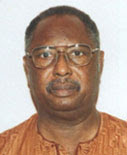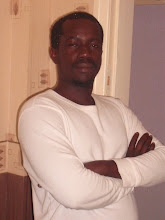

Welcome to The Gambia, the land of "His Excellency President Professor Alhaji Dr AJJ Jammeh", a sign at airport tells visitors to the West African nation.
It is a country where the ubiquitous display of a photograph of one man relegates the North Korean leader to the backburner.
Children sing his praises; women dance to his name; men adore him - mostly willy-nilly.
I would guess, of every three billboards in the capital Banjul, at least two have President Yahya Jammeh's photograph on them.
His name has to be in the newspapers lest an editor is tagged "anti-Jammeh".
His image is almost always on the state-owned Gambia Radio and Television Services (GRTS) for much of the news bulletin.
One day it shows the country's armed forces working on his farm as he gazes on benignly. The day before it was civil servants doing the same thing. The next it will be some group or other - there as an act of loyalty. And on and on and on, GRTS reports.
Petty squabbles
All this publicity prompted one opposition spokesman to tell me wryly that the president is the "most popular" person in the country.
"It poses a lot of problems for us," he said.
That is an understatement. Like elsewhere on the continent, opposition parties in The Gambia are beset with problems besides that of being out of power.
The fact that the country has known only two regimes - some would say hegemonies - since becoming independent from the UK in 1965 seems to have blinded the opposition to the fact that their own "democratic credentials are as tattered and torn as the current military strongman-turned-civilian president", according to one Gambian journalist, who did not wish to be named.
The problem is that with the president's authoritarian presence lauding over a nation mired in poverty, you would think the opposition would overcome any petty squabbles to focus on a common enemy.
In fact, many of the leaders of the five opposition political parties in the country can barely stand to hear each other's names.
Crucially, many Gambians say these parties are guilty of the very thing they often accuse the governing Alliance for Patriotic Reorientation and Construction (APRC) of being: Undemocratic and lacking transparency.
Oxygen starved
Many do not even have headquarters, and where they do the structure is barely standing upright.
Granted, though, they are operating in less-than-ideal circumstances.
The government is stifling criticism by trying to cut off the oxygen for some of these parties. The United Democratic Party (UDP), for example, is banned from holding public rallies.
But that is no consolation for many ordinary citizens.
"My greatest concern is what happens after President Jammeh leaves or is removed from office," said a school teacher, who did not want to give his name.
He lashed out at the president calling him "a despot".
But said there was no alternative to Mr Jammeh's rule as opposition parties are not offering anything viable and lack the democratic torch to brighten his country's future.
This is a common view. One civil servant asked: "When was the last time any political party held any credible and transparent national delegates' conference to subject themselves to the democratic will of their members?"
Long-time leaders
The UDP came second in 2006 polls, and is thus the official opposition, but last held a conference in 2000. Some critics even dispute that date, saying the meeting was anything but a convention. The UDP say that they are not even sure when they will hold the next one.
Most glaringly perhaps, the party has had only one leader since it was founded in 1996.
Its spokesman and campaign manager since its birth, Femi Peters, said Oussainou Darboe has been at the helm for so long because he is "the fittest person" and shows no compunction in saying so, adding: "If we find somebody credible enough to replace him, we shall replace him."
Without a delegates' conference in the near future, this will not happen anytime soon.
Mr Darboe himself was out of the country on vacation during my visit and refused to comment via email.
Reacting to all this, a journalist I met who is not a supporter of President Jammeh simply shook his head.
It seems The Gambia does not follow the precedent of its near-neighbour.
In Sierra Leone the tendency is that anyone who leads a party to a defeat at the polls immediately ceases to be its leader. In contrast, in The Gambia there seems to be no such limit imposed either by a party's internal constitution or its electoral fate.
Halifa Sallah, once the most vocal and courageous critic of the current regime, is sadly another case in point.
He is probably as right as he is complicit when he says Gambians have lost hope in all their politicians.
Mr Sallah has been secretary-general of the opposition People's Democratic Organisation for Independence and Socialism (PDOIS) since its establishment in 1987.
When asked about internal democracy - or the lack of it - within his party, he deviates into a history lesson, and then gets all philosophical.
Unconvincing
Defending his long stay at the top echelon of the PDOIS, the former presidential candidate told me that his party was "in transition" from 1987 to 1994 when the military coup happened which banned all political parties.
Once the ban was lifted in 1996, he said his PDOIS functioned up to 2001 when they formed an alliance with four other political parties under the National Alliance for Democracy and Development (NADD) - but this was an alliance that collapsed pretty much before it started.
But Mr Sallah is still the PDOIS secretary-general 22 years on. He concedes the point but is quick to add that his party "operates on [the system of] collective leadership. Individuals who are in authority do not have individual powers… [because] there is no individual-centred leadership in the party," he said, sounding as unconvinced as he looks embarrassed.
With a governing party respected only by its die-hard supporters, Gambians and most diplomats in the country believe that opposition parties should show a greater level of democracy within to send a strong message to those in power.
But perhaps Gambians are all-too-familiar with a statement by their first leader, Sir Dawda Kairaba Jawara, who after nearly 30 years in power, announced he was stepping down.
This did not stop him returning to the fray shortly thereafter saying that his People's Progressive Party had been prevailed upon by the people to let him stay.
Not long afterwards he was overthrown in Mr Jammeh's bloodless and initially popular coup.
Yet it seems Sir Dawda's words are those many Gambian politicians are still espousing.
By Umaru Fofana
Source: BBC Focus on Africa magazine




















